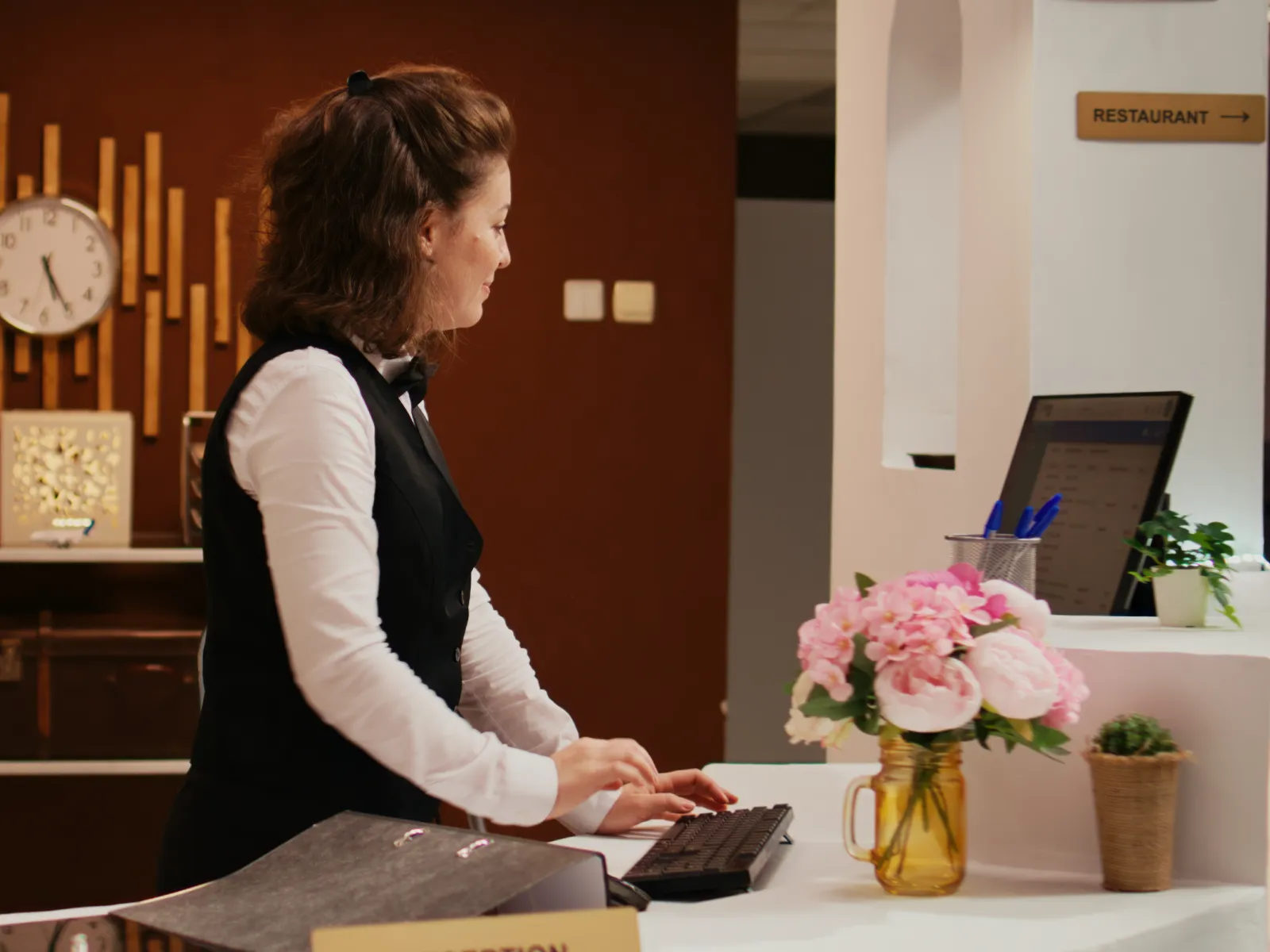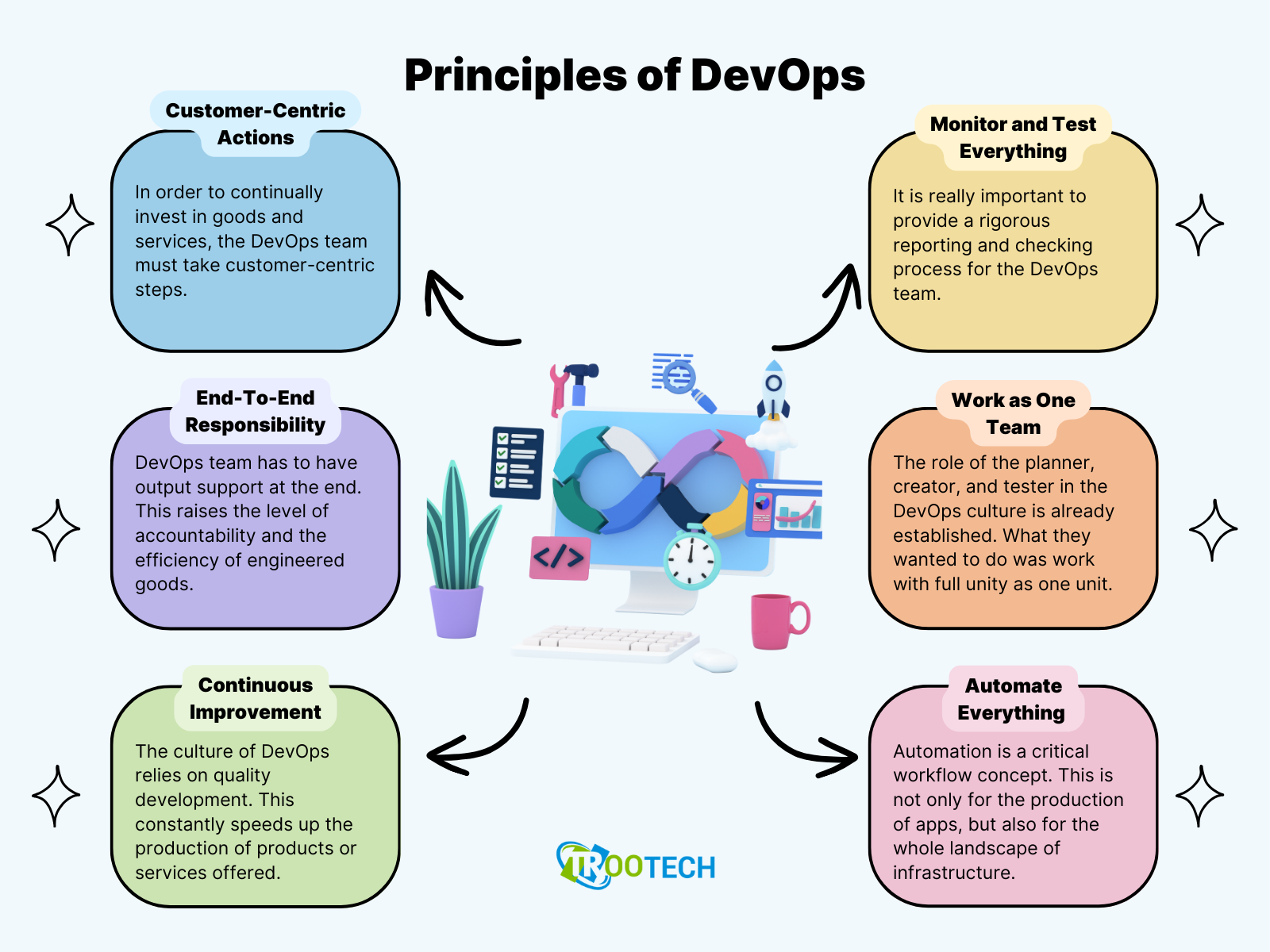Revolutionizing Guest Experience with Cloud Engineering and DevOps Services
Today's guests expect much more than just a cozy bed, delicious breakfast, and a pool of amenities when they opt for hospitality. They seek efficient management and digital solutions that enhance their experience and convenience.

Introduction
Today's guests expect much more than just a cozy bed, delicious breakfast, and a pool of amenities when they opt for hospitality. They seek efficient management and digital solutions that streamline their experience, reducing stress and enhancing convenience.
In response to these evolving expectations, hospitality industry professionals are increasingly turning to cloud engineering and DevOps solutions. These technologies not only improve operational efficiency but also empower hotels to deliver personalized, memorable guest experiences in a fast-paced digital era.
Yes, you may wonder about DevOps and automation in hospitality too.
Let's have a look at statistical data to have an answer to this:
According to recent stats by Research and Markets, online sales in travel are projected to reach a whopping $1.8 trillion by the year 2025, with travel cloud innovation being a key driver of this growth.
Additionally, the cloud computing market is projected to have a Compound Annual Growth Rate (CAGR) of 16.3% through 2026.
Before getting into all the technological terms, let us give you a brief introduction about what DevOps and cloud engineering are, and how they are interconnected.
What is Cloud Engineering and DevOps?
Cloud engineering revolves around designing, developing, and managing cloud-based systems. It's the backbone that supports hotels in scaling their operations, enhancing security, and cutting down on hardware costs.
This shift not only meets but exceeds guest expectations, setting a new standard for hospitality excellence.
DevOps, short for Development and Operations, refers to a set of practices that foster collaboration between software development teams and IT operations. It's all about automating processes and ensuring faster, more reliable deployment of digital solutions.
DevOps and cloud engineering form a powerful synergy in the hospitality industry, revolutionizing how hotels manage operations and deliver personalized guest experiences.
Now, let's explore how these technologies are reshaping hospitality operations.
The Role of Cloud Engineering in Hospitality
In the fast-paced world of hospitality, where guest happiness relies on smooth experiences and efficient operations, cloud engineering is a game-changer. By using scalable and secure cloud-based solutions, hotels not only make operations smoother but also give guests more personalized and convenient experiences.
Cloud engineering helps hotels adapt quickly to changing needs, manage resources better, and keep guest information safe—all while saving money on traditional ways of doing things.
This digital shift isn't just about keeping up; it's about setting a new standard for how well hotels take care of their guests.
Benefits of Cloud-Based Solutions
| Scalability | Easily scale resources up or down based on demand, ensuring optimal performance. |
| Cost Efficiency | Reduce upfront investment in hardware and maintenance costs. |
| Accessibility | Access data and applications from anywhere, enhancing operational flexibility. |
Cloud technology has revolutionized how hotels manage operations and deliver guest experiences.
Technical Aspects of Cloud Engineering:
Infrastructure as a Service (IaaS):
IaaS lets hotels rent computing resources like servers and storage over the Internet. This means hotels don’t have to buy and maintain expensive hardware. It’s like renting a fully equipped office space instead of owning one. This setup is super flexible, allowing hotels to add or reduce resources based on their needs quickly. This adaptability helps hotels handle busy seasons smoothly, ensuring guests always get a top-notch experience.
Platform as a Service (PaaS):
PaaS offers hotels a ready-to-use platform for developing, running, and managing applications without worrying about the underlying tech. With PaaS, hotels can speed up the development of new services and features, bringing fresh and innovative experiences to their guests more quickly.
Software as a Service (SaaS):
SaaS delivers software applications over the internet on a subscription basis. This means hotel staff can access these apps from anywhere with an internet connection, whether they’re on-site or working remotely. Common SaaS tools in hospitality include email, collaboration platforms, and business analytics. These tools help staff communicate better, streamline operations, and make informed decisions, all contributing to a better guest experience.
Curious about how cloud engineering can streamline your hotel's processes?
Learn how tailored solutions can enhance scalability and efficiency
Cloud-based Applications for Hospitality Business

Property Management Systems (PMS):
A Property Management System (PMS) is like the central nervous system of a hotel. It handles everything from reservations and guest check-ins to room assignments and billing. By moving these operations to the cloud, hotels can streamline their workflow and provide faster, more efficient service to guests.
Cloud-based PMS allows staff to access real-time information from anywhere, enabling them to respond promptly to guest requests and manage room inventory effectively.
Hotels using PMS typically report smoother operations, reduced check-in times, and improved guest satisfaction.
Customer Relationship Management (CRM) Systems:
CRM systems help hotels build and maintain relationships with guests by storing and analyzing guest information and preferences. This information allows hotels to offer personalized experiences, such as recommending preferred room types, amenities, or local activities based on past stays.
Cloud-based CRM systems enable seamless communication between hotel staff and guests, enhancing service delivery and fostering guest loyalty.
Hotels using CRM systems often see an increase in direct bookings and higher guest satisfaction scores. A recent research by Research Gate showed CRM has a significant total effect on Loyalty by 0.85, which means, increasing CRM by one unit will increase Loyalty by 85%.
Booking System:
Booking Systems enable guests to book rooms, dining reservations, spa appointments, and other services directly through the hotel's website or mobile app. These systems are crucial for modern travellers who prefer the convenience of making reservations online anytime, anywhere.
Cloud-based booking systems integrate seamlessly with PMS, ensuring accurate availability and pricing information in real-time.
Hotels with user-friendly online booking systems experience higher conversion rates and fewer booking errors. As the data stated, in 2023, a large majority of travellers (72%) said they preferred to book their trips online, which is enough to highlight how much having an online booking system is essential.
Revenue Management Systems:
Revenue Management Systems help hotels optimize pricing strategies based on market demand, competitor analysis, and other factors. By analyzing historical data and forecasting future trends, these systems recommend optimal room rates and promotional offers to maximize revenue per available room (RevPAR).
Cloud-based revenue management systems provide real-time insights and enable hotels to adjust pricing dynamically to capitalize on demand fluctuations.
Hotels using revenue management systems typically achieve higher occupancy rates and increased profitability.
These cloud applications exemplify how technology enhances operational efficiency, guest satisfaction, and profitability in the hospitality industry. By implementing cloud engineering, hotels can stay agile, competitive, and responsive to guest expectations in an increasingly digital era.
Implementing DevOps in Hospitality
Imagine a scenario where a hotel’s booking system crashes during peak season.
(Sounds like a nightmare, right?)
Without DevOps practices, resolving such an issue might take hours or even days, leading to frustrated guests and lost revenue. However, with DevOps, such problems can be identified and resolved rapidly, ensuring smooth and uninterrupted service.
Understanding DevOps is crucial because it accelerates the release of new features and bug fixes and enhances the overall quality and stability of applications.
In today’s fast-paced digital world, implementing DevOps in the hospitality industry can dramatically enhance operational efficiency and guest satisfaction.
Understanding DevOps Principles.
Before implementing DevOps in the hospitality business, it’s important to grasp its principles. This understanding ensures that the practices are effectively integrated, leading to streamlined operations, higher service quality, and quicker delivery of guest-centric innovations.

These principles are especially relevant in the context of cloud computing in the hospitality industry, where they enable hotels to introduce improvements rapidly and reliably, thus enhancing the guest experience.
Another few practices that closely work together with DevOps to improve software development and deployment processes:
Collaboration:
Breaking down silos between development and operations teams enhances communication and efficiency. A collaborative approach ensures that everyone is aligned and working towards common goals, fostering a culture of shared responsibility and accountability.
Automation:
Automating repetitive tasks reduces errors and speeds up processes. Automation tools like Jenkins, Docker, and Kubernetes facilitate continuous integration and continuous deployment (CI/CD), ensuring that applications are delivered quickly and reliably.
Continuous Integration (CI):
CI is the practice of frequently merging code changes from multiple developers into a shared repository. Each merge triggers automated builds and tests to detect integration errors early. CI helps teams identify and address issues quickly, ensuring that the codebase remains stable and deployable at all times.
Continuous Deployment (CD):
CD extends CI by automating the deployment of code changes to production environments after successful testing. It enables teams to deliver software updates to users rapidly and reliably. CD minimizes manual interventions and reduces the risk of human error during deployment, leading to faster delivery cycles and improved release quality.
Here’s why CI/CD is crucial:
| Aspect | Importance |
|---|---|
| Speed and Efficiency | Automates processes, reducing development, testing, and deployment times, maintaining a competitive edge. |
| Quality and Reliability | Ensures code changes do not introduce bugs, enhancing the reliability of cloud computing in hotel industry applications. |
| Scalability | Supports scalability through cloud engineering services, allowing hotels to handle increased demand effortlessly. |
| Guest Satisfaction | Rapidly deploys new features and fixes, improving guest experiences and supporting digital transformation in hospitality. |
In essence, DevOps provides the cultural and organizational framework for collaboration and automation, while CI/CD practices provide the technical processes and tools to achieve continuous integration, testing, and deployment of software updates with speed, reliability, and efficiency.
Technical Aspects of DevOps Implementation
Version Control Systems (VCS):
Tools like Git help teams manage changes to their code efficiently. Imagine a big team of chefs all working on different dishes in the same kitchen. With VCS, each chef can work on their dish without getting in each other’s way, and when they’re done, everything comes together seamlessly. This ensures that new features are added smoothly and without conflicts.
Configuration Management:
Tools like Ansible, Puppet, and Chef automate the setup and configuration of servers and applications. It’s like having a recipe book that guarantees every dish comes out the same every time. These tools ensure that all environments are consistent, reducing the chance of errors and making it easier to manage and roll out changes.
Monitoring and Logging:
Tools like Prometheus, Grafana, and the ELK stack provide real-time monitoring and logging. Think of it as having a security team that keeps an eye on everything happening in the hotel 24/7. They catch issues early and fix them quickly, minimizing downtime and ensuring that everything is always running smoothly for the guests.
Challenges in DevOps Implementation
Cultural Shift:
Switching to DevOps means a big cultural change, as it focuses on teamwork and continuous improvement. This can be tough for traditional organizations where teams usually work in separate silos. Strong leadership and a clear vision are essential to guide everyone through this change and make sure it sticks.
Skill Gaps:
Implementing DevOps requires specific technical skills. Investing in training your current staff and hiring experienced professionals is crucial for success. Making sure your team has the right skills and knowledge will help them smoothly transition to new processes and tools.
Tools Integration:
Getting various DevOps tools to work well together can be tricky. Careful planning and choosing the right tools for your needs are key to avoiding compatibility issues and ensuring everything runs smoothly. This will help create a seamless workflow and make the most out of your DevOps implementation.
Looking to Implement Cloud and DevOps-Based Features for Your Hospitality Business?
Enhance Guest Experiences and Streamline Operations with Cutting-Edge Cloud Solutions
Enhancing Guest Experiences with Cloud and DevOps based Features

In the hospitality world, where "making guests feel at home" is everything, using cloud computing is now essential. It helps hotels give guests exactly what they want, like setting up rooms just how they like and offering their favourite foods.
Cloud computing in the hospitality industry lets hoteliers change things instantly based on what guests say, whether it's adjusting room settings or quickly fixing any issues. Plus, with mobile apps and touchless tech powered by the cloud, guests can book rooms, check in, and get service without any hassle, making their stay smoother and safer.
Personalized guest services through data analytics
Personalized guest services powered by data analytics are revolutionizing guest experiences. This data-driven approach allows hotels to create personalized experiences tailored to each guest's preferences, whether it's recommending room upgrades based on past preferences or suggesting personalized amenities and services.
Furthermore, technology in the hotel industry supports real-time adjustments to guest services. For example, hotels can use cloud-based systems to monitor guest feedback in real-time, allowing for immediate adjustments such as room temperature adjustments, faster Wi-Fi connections, or prompt resolution of service issues.
This agility not only improves guest satisfaction but also strengthens the hotel's reputation for responsiveness and customer care in a competitive market.
As hotels continue to invest in cloud engineering services and hospitality management software development, the integration of data analytics will play a pivotal role in shaping personalized guest experiences and maintaining a competitive edge in the hospitality industry.
Real-time service adjustments based on guest feedback
In today's competitive hospitality landscape, real-time service adjustments based on guest feedback are crucial for delivering exceptional guest experiences. Cloud computing in the hospitality industry enables hotels to collect and analyze guest feedback swiftly and effectively.
Through cloud-based systems, hotels can monitor guest reviews and comments across various platforms in real-time, identifying areas for improvement and addressing concerns promptly. This proactive approach not only resolves issues swiftly but also demonstrates a commitment to guest satisfaction, fostering loyalty and positive word-of-mouth.
As hotels embrace the future of DevOps with enhanced security measures (DevSecOps) and adopt top technology trends like AI-driven personalization and IoT integration, real-time service adjustments will continue to evolve, providing guests with seamless and personalized experiences that set hotels apart in a competitive market.
Mobile and contactless solutions powered by the cloud
Mobile and contactless solutions powered by cloud computing are transforming guest interactions in the hospitality industry. Cloud computing in the hotel industry facilitates the development of mobile apps that enable guests to manage their entire stay experience from their smartphones.
Guests can seamlessly book rooms, check-in and check out digitally, request services, and access hotel information and amenities—all through intuitive mobile interfaces. This shift towards contactless solutions not only enhances guest convenience and efficiency but also aligns with health and safety priorities, particularly in a post-pandemic era.
As hospitality management software development continues to evolve, mobile and contactless solutions will play a pivotal role in delivering personalized guest experiences while optimizing operational efficiency.
Operational Benefits of Cloud and DevOps
In the reputable world of hospitality, streamlining operations is essential for delivering exceptional guest experiences. Cloud computing in the hospitality industry and DevOps practices are at the forefront of this transformation.
As said earlier too, the benefits of cloud and DevOps can be a win-win situation for both the hotelier as well as guest.
Take a look at how cloud computing and DevOps are revolutionizing hospitality operations, streamlining tasks, enhancing security, and ensuring business continuity.
Streamlining Operations:
Automating routine tasks with cloud and DevOps solutions can cut down on manual effort and errors, making everything run more smoothly. For instance, automating things like room assignments and billing ensures they’re done accurately, letting your staff focus on more important tasks. Better communication tools also mean that your staff can stay connected and informed, which helps them work together more efficiently and provide better service to guests.
Enhancing Security and Compliance:
Cloud providers offer strong security measures like data encryption and regular updates to keep guest data safe. They also make it easier to comply with industry regulations like GDPR and PCI-DSS through automated checks. This takes a lot of the pressure off your hotel’s IT team and ensures that guest data is handled securely, which builds trust with your guests.
Disaster Recovery and Business Continuity Planning:
Cloud solutions provide reliable disaster recovery options, so hotels can quickly bounce back from outages with minimal disruption. With cloud-based backup and recovery services, your critical data and applications are protected, ensuring that you can keep things running smoothly even when unexpected events happen. This kind of resilience is key to maintaining high service quality and keeping guests satisfied.
Challenges and Considerations
Just as every coin has two sides, implementing cloud computing and DevOps in the hospitality industry comes with its own set of challenges.
While these technologies offer significant benefits, they also present hurdles that need careful consideration. Initial costs for new technologies and training can be substantial, potentially straining budgets. Ensuring robust data security and compliance is another critical concern, as safeguarding sensitive guest information against breaches requires continuous vigilance.
Additionally, integrating new cloud-based systems with existing infrastructure can be complex and time-consuming.
Finally, managing workforce resistance to new workflows and automation highlights the need for effective change management strategies.
Potential challenges in adopting Cloud and DevOps:
- Initial Investment Costs: Significant financial resources are required for new technologies and staff training.
- Data Security and Compliance: Ensuring robust security measures to protect sensitive guest information and comply with industry regulations.
- Integration with Existing Systems: Potential compatibility issues when merging new cloud-based systems with current infrastructure.
- Staff Resistance: Managing resistance from employees who are accustomed to traditional workflows.
- Continuous Monitoring: The need for ongoing vigilance and updates to maintain security and performance.
- Scalability Issues: Ensuring that new solutions can scale effectively with business growth and changing demands.
- Downtime and Disruptions: Possible operational disruptions during the transition and integration phases.
However, with the right strategies and technological support, these challenges can be effectively mitigated.
Strategies to Overcome These Challenges:
- Gradually roll out new technologies to spread out costs and reduce the immediate financial burden. This approach also allows for adjustments based on feedback during each phase.
- Utilize advanced security measures such as encryption, multi-factor authentication, and regular security audits to safeguard data. Employing DevOps vs DevSecOps practices ensures that security is integrated into every stage of the development process.
- Leverage integration platforms and middleware to ensure compatibility between new cloud-based systems and existing infrastructure. Cloud Engineering Services can provide custom solutions to address specific integration challenges.
- Implement comprehensive training programs to familiarize staff with new technologies. Effective change management strategies, including clear communication and support, can help reduce resistance.
- Use automated monitoring tools to continuously oversee system performance and security. This proactive approach can quickly identify and address potential issues.
- Avoid vendor lock-in by adopting a multi-cloud strategy, using services from multiple providers to ensure flexibility and mitigate risks.
- Choose cloud solutions that are designed to scale effortlessly with your business needs. A well-planned Cloud Migration Strategy can help ensure that your infrastructure can grow alongside your operations.
- Develop and regularly update disaster recovery and business continuity plans to minimize downtime. Cloud-based backup and recovery solutions can ensure quick restoration of services in case of disruptions.
By implementing these strategies complimented with the right set of technology, hotels can successfully overcome the challenges of adopting cloud computing in hospitality and DevOps. This ensures a smooth transition and allows them to reap the full benefits of these transformative technologies, ultimately driving Digital Transformation in Hospitality.
The Future of DevOps in the Upcoming Years looks promising, as integrating these technologies will be pivotal in shaping the technology in the hospitality industry. As we look at the Top Technology Trends 2024, a focus on Hospitality Management Software Development and effective use of cloud computing in the hotel industry will be essential for success.
Interested in Enhancing Guest Experiences Through Advanced Technology?
Explore How TRooTech's Cloud Engineering and DevOps Solutions Can Help
On a Final Note
In today's dynamic hospitality landscape, adopting cloud computing in hospitality and integrating DevOps practices isn't just about keeping up—it's about leading the way.
Cloud Engineering Services streamline operations, making everything from reservations to guest services seamless and scalable.
Looking ahead, the Future of DevOps in Upcoming Years promises exciting advancements in technology in the hospitality industry, catalyzing Digital Transformation in Hospitality.
To be on the Top Technology Trends 2024, like AI-driven personalization and mobile innovations, a strategic Cloud Migration Strategy is essential. These innovations aren't just tools; they empower hotels to redefine guest experiences and operational efficiency.
It's high time for hospitality businesses to implement the transformative power of cloud computing in the hospitality industry and DevOps. However, along with investing in cloud solutions, it's essential to consider the expertise of a dedicated DevOps team for professional guidance and support.
TRooTech stands ready to lead the charge with innovative Cloud Engineering Services tailored for Hospitality Management Software Development. By partnering with TRooTech, hotels can not only meet but exceed guest expectations, setting new benchmarks for service excellence and innovation in the industry.
FAQs
Cloud computing and DevOps complement each other by shared principles of automation, collaboration, and scalability.
DevOps practices facilitate rapid and continuous delivery of software updates and improvements, ensuring agility in deploying applications on cloud platforms. Cloud services provide the infrastructure and resources needed for DevOps workflows, enabling teams to build, test, and deploy applications efficiently across scalable environments. Together, cloud and DevOps enhance operational efficiency, scalability, and flexibility in managing hospitality services and guest experiences.
Several cloud platforms are suitable for DevOps practices in the hospitality industry, including Amazon Web Services (AWS), Microsoft Azure, and Google Cloud Platform (GCP). These platforms offer a range of services such as compute resources, storage, and networking capabilities that support continuous integration, deployment, and monitoring required by DevOps workflows.
Each platform provides tools and services tailored for DevOps, facilitating automation, collaboration, and scalability essential for managing technology in the hotel industry effectively.
DevOps focuses on integrating development (Dev) and operations (Ops) teams to enhance collaboration and efficiency in software development and deployment. It emphasizes automation, continuous integration, and continuous delivery (CI/CD).
DevSecOps extends DevOps principles by integrating security (Sec) into every phase of the software development lifecycle. It emphasizes building security into DevOps processes, ensuring that security considerations are addressed from the outset rather than as an afterthought.
Cloud computing and DevOps represent the future of technology in the hotel industry, offering unparalleled scalability, flexibility, and efficiency. Cloud platforms enable hospitality businesses to scale resources dynamically, reduce operational costs, and innovate rapidly. DevOps practices enhance agility and collaboration, enabling continuous delivery of new features and updates to meet evolving guest expectations.
TRooTech is recognized as a leading company capable of developing robust Hospitality Management Software tailored to the unique needs of the hotel industry. With expertise in cloud services in hospitality and technology in the hotel industry, TRooTech delivers innovative solutions that streamline operations, enhance guest experiences, and drive digital transformation. Their comprehensive approach integrates DevOps principles to ensure scalability, security, and continuous improvement in hospitality management software development.

